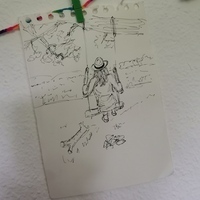Inhalt: Alle Gedichte von Emily Dickinson.
Eindruck/Gedanken:
Im Studium bin ich bereits mit einigen Gedichten von Emily Dickinson in Berührung gekommen und sie haben mich dazu inspiriert, mehr lesen zu wollen. Dickinson hat sehr viele Gedichte geschrieben, kurze und lange, über die verschiedensten Themen. Wiederkehrende Themen sind insbesondere Natur, Religion und der Tod. Viele Gedichte haben ihre ganz eigene Melodie und auch wenn mich nicht alle Gedichte gleichermaßen berührt/inspiriert haben, so war ich dennoch begeistert von den tiefen Blicken in die Seele der Natur und der Menschen und den tiefen, verborgenen Gefühlen der Gedichte.
Eine Auswahl meiner Lieblingsgedichte:
Nr. 1 (1850): Dieses Gedicht hat einfach eine zauberhafte Melodie.
Awake ye muses nine, sing me a strain divine,
unwind the solemn twine, and tie my Valentine!
-------
Oh the Earth was made for lovers, for damsel, and hopeless swain,
for sighing, and gentle whispering, and unity made of twain,
all things do go a courting, in earth, or sea, or air,
God hath made nothing single but thee in his world so fair!
The bride, and then the bridegroom, the two, and then the one,
Adam, and Eve, his consort, the moon, and then the sun;
the life doth prove the precept, who obey shall happy be,
who will not serve the sovreign, be hanged on fatal tree.
The high do seek the lowly, the great do seek the small,
none cannot find who seeketh on this terrestrial ball;
The bee doth court the flower, the flower his suit receives,
and they make a merry wedding, whose guests are hundred leaves;
the wind doth woo the branches, the branches they are won,
and the father fond demandeth the maiden for his son.
The storm doth walk the seashore humming a mournful tune,
the wave with eye so pensive, looketh to see the moon,
their spirits meet together, they make them solemn vows,
no more he singeth mournful, her sadness she doth lose.
The worm doth woo the mortal, death claims a living bride,
night unto day is married, morn unto eventide;
Earth is a merry damsel, and Heaven a knight so true,
and Earth is quite coquettish, and he seemeth in vain to sue.
Now to the application, to the reading of the roll,
to bringing thee to justice, and marshalling thy soul;
thou are a human solo, a being cold, and lone,
wilt have no kind companion, thou reap’st what thou hast sown.
Hast never silent hours, and minutes all too long,
and a deal of sad reflection, and wailing instead of song?
There’s Sarah, and Eliza, and Emeline so fair,
and Harriet, and Susan, and she with curling hair!
Thine eyes are sadly blinded, but yet thou mayest see
Six true, and comely maidens sitting opon the tree;
Approach that tree with caution, then up it boldly climb,
and seize the one thou lovest, nor care for space, or time!
Then bear her to the greenwood, and build for her a bower,
and give her what she asketh, jewel, or bird, or flower;
and bring the fife, and trumpet, and beat opon the drum –
and bid the world Goodmorrow, and go to glory home!
Nr. 4 (1854): Mir gefällt die kleine Geschichte, von der das Gedicht erzählt.
I have a Bird in spring
Which for myself doth sing –
The spring decoys.
And as the summer nears –
And as the Rose appears,
Robin is gone.
Yet do I not repine
Knowing that Bird of mine
Though flown –
Learneth beyond the sea
Melody new for me
And will return.
Fast in a safer hand
Held in a truer Land
Are mine –
And though they now depart,
Tell I my doubting heart
They’re thine.
In a serener Bright,
In a more golden light
I see
Each little doubt and fear,
Each little discord here
Removed.
Then will I not repine,
Knowing that Bird of mine
Though flown
Shall in a distant tree
Bright melody for me
Return.
Nr. 11 (1858): Eine berührende Mahnung an die Endlichkeit der Natur.
Nobody knows this little Rose –
It might a pilgrim be
Did I not take it from the ways
And lift it up to thee.
Only a Bee will miss it –
Only a Butterfly,
Hastening from far journey –
On it’s breast to lie –
Only a Bird will wonder –
Only a Breeze will sigh –
A Little Rose – how easy
For such as thee to die!
Nr. 127 (1859): Der Vergleich zwischen Kindern und Blumen ist einfach wunderschön gelungen.
As children bid the Guest „Good night“
And then reluctant turn –
My flowers raise their pretty lips –
Then put their nightgowns on.
As children caper when they wake –
Merry that it is Morn –
My flowers from a hundred cribs
Will peep, and prance again.
Nr. 130 (1860): Ein anderer Blick auf die Liebe?
„Mama“ never forgets her birds –
Though in another tree.
She looks down just as often
And just as tenderly,
As when her little mortal nest
With cunning care she wove –
If either of her „sparrows fall“,
She „notices“ above.
Nr. 148 (1860): Es ist interessant, was herauskommen kann, wenn man nur ein Wort hinterfragt.
Will there really be a „morning“?
Is there such a thing as „Day“?
Could I see it from the mountains
If I were as tall as they?
Has it feet like Water lilies?
Has it feathers like a Bird?
Is it brought from famous countries
Of which I have never heard?
Oh some Scholar! Oh some Sailor!
Oh some Wise Man from the skies!
Please to tell a little Pilgrim
Where the place called „morning“ lies!
Nr. 209 (1861): Eine Überlegung über den Wert der Dinge.
I lost a World – the other day!
Has Anybody found?
You’ll know it by the Row of Stars
Around it’s forehead bound!
A Rich man – might not notice it –
Yet – to my frugal Eye,
Of more Esteem than Ducats –
Oh find it – Sir – for me!
Nr. 314 (1862): Eine unglaublich berührende, tief empfundene Metapher über die Hoffnung – eins meiner absoluten Lieblingsgedichte.
„Hope“ is the thing with feathers –
That perches in the soul –
And sings the tune without the words –
And never stops – at all –
And sweetest – in the Gale – is heard –
And sore must be the storm –
That could abash the little Bird
That kept so many warm –
I’ve heard it in the chillest land –
And on the strangest Sea –
Yet – never – in Extremity,
It asked a crumb – of me.
Nr. 315 (1862): Ein Gedicht über das leichte Sterben – oder die Vorstellung davon.
To die – takes just a little while –
They say it does’nt hurt –
It’s only fainter – by degrees –
And then – it’s out of sight –
A darker Ribbon – for a Day –
A Crape opon the Hat –
And then the pretty sunshine comes –
And helps us to forget –
The absent – mystic – creature –
That but for love of us –
Had gone to sleep – that soundest time –
Without the weariness -
Nr. 529 (1863): Eine traurige Geschichte.
A Dying Tiger – moaned for Drink –
I hunted all the Sand –
I caught the Dripping of a Rock
And bore it in my Hand –
His mighty Balls – in death were thick –
But searching – I could see
A Vision on the Retina
Of Water – and of me –
‘Twas not my blame – who sped too slow –
‘Twas not his blame – who died
While I was reaching him –
But ‘twas – the fact that He was dead –
Nr. 534 (1863): Eine Lebensweisheit.
How many Flowers fail in Wood –
Or perish from the Hill –
Without the privilege to know
That they are Beautiful –
How many cast a nameless Pod
Opon the nearest Breeze –
Unconscious of the Scarlet Freight –
It bear to other eyes –
Nr. 982 (1865): Über den Sinn des Lebens.
If I can stop one Heart from breaking
I shall not live in vain
If I can ease one Life the Aching
Or cool one Pain
Or help one fainting Robin
Unto his Nest again
I shall not live in vain.
Nr. 1263 (1872): Das Lieblingsgedicht meines Dozenten – und eine inspirierende Überlegung zur Wahrheit.
Tell all the truth but tell it slant –
Success in Circuit lies
Too bright for our infirm Delight
The Truth’s superb surprise
As Lightning to the Children eased
With explanation kind
The Truth must dazzle gradually
Or every man be blind –
Nr. 1425 (1877): Über die Bedeutung eines Lächelns.
They might not need me – yet they might.
I’ll let my Heart be just in sight –
A smile so small as mine might be
Precisely their necessity –
Nr. 1441 (1877): Der Wind der Nacht.
How lonesome the Wind must feel Nights –
When People have put out the Lights
And everything that has an Inn
Closes the Shutter and goes in –
How pompous the Wind must feel Noons
Stepping to incorporeal Tunes
Correcting errors of the sky
And clarifying scenery
How mighty the Wind must feel Morns
Encamping on a thousand Dawns –
Espousing one and spurning all
Then soaring to his Temple Tall –


